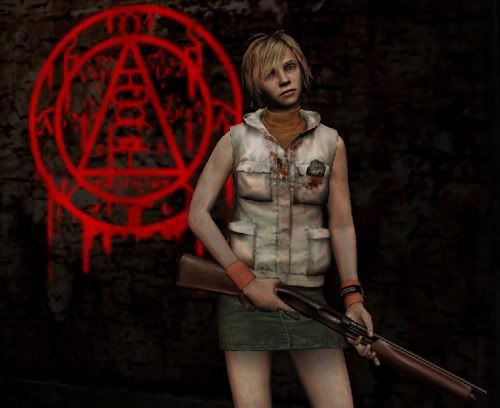Gender could matter in horror games, but it doesn't come up due to political correctness. In real life girls are weaker and less physically capable than guys are given a similar amount of development, which is why sporting events and such remain segregated. Then there is the who issue of rape, forced pregnancy, and other things, while dudes can be raped it's more of a present threat to girls, and there is a reason why the whole "OMG, there is something growing inside me" horror trope exists, along with some of the grosser monster birthing scenes in hollywood.
Video games generally aren't willing to go in the directions that would make a gender differance important, which is one of the reasons why most horror game sucks, they aren't willing to produce the kind of offensive and uncomfortable content that is going to shock a true horror fan and give them what they crave (which is usually a sort of retroactive enjoyment when they look back on something and remember how F@cked up it was, more than an "of the moment" enjoyment... hard to articulate). Pretty much all the reasons why I'm likely to get attacked in this thread for saying this are the reasons why it's a non-factor. For all intents and purposes male and female protaganists are pretty much the same, just with differant art and voice work.
As far as Silent Hill 3 goes, I'd point out that the degree to which Heather could kill things was kind of the point of that game, which was subverting the whole "heroic monster basher" trope. The ending you get is largely dependant on the number of monsters you kill. I believe the eventual reveal at the end of that one (it's been a long time) is that she's hallucinating and a lot of what she sees as monsters are actually people, you kill too many of them and she's pretty much revealed to be a rampaging, seriel killer, out of touch with reality. Granted the ending can vary, but it's a game that intentionally made it easy to kill the monsters, especially compared to the first two games, but then also punished you for doing so.
Incidently there is a variation on this in "Downpour" involving when you deliver a coup de grace to downed monsters. I won't say more about it due to spoilers since that's the newest game, but the point is that it's something Silent Hill recycled again in a somewhat differant form. Excepting perhaps "Homecoming" the general rule in the series being that the more capable your protaganist is of killing, either conceptually or in practice, the less desirable it is to getting the best possible, or "true" ending.
I'd argue (other points aside) that Heather is perhaps one of the most vulnerable Silent Hill protaganists, the abillity to inflict death and destruction (and the temptation to solve problems that way) actually being a limitation since to really "win" you have to go against that impulse. Incidently this entire "twist" was missing from the Silent Hill movie they loosely based on this storyline.
Truthfully I think the problem with horror games nowasys has nothing to do with gender, or the abillity to fight and kill, but entirely with the industry's unwillingness to push the envelope the way successful Hollywood movies have done. Typically successful horror movies, especially franchises, have gotten that way by having fans talk about how utterly F@cked up they are, whether that's Pinhead with his chains in Hellraiser, Freddy Kruegar's elaborate dreamscapes where he does things like trap girls in demonic high chairs and feed them their own guts, or even Jigsaw's elaboratly sadistic death traps. In general the most successful horror movies have had as many people going off about how bad they sucked, or how they were just "gross and shocking" because they hit everyone's yuck buttons. Good horror will never be a mainstream success because not everyone can find a sort of vicarious enjoyment out of being made uncomfortable. This is why it's always been so relatively rare. With Hollywood having problems, it only makes sense that the gaming industry which has become Hollywood's retarded younger sibling when it comes to producing content, rating it appropriatly, and understanding and catering to niche audiences as opposed to simply the mainstream, isn't going to create many successul works of horror, and rather mostly stuff that goes through the motions and at best manages to be mildly creepy with some jump out scares because that's all the mainstream can really handle.

